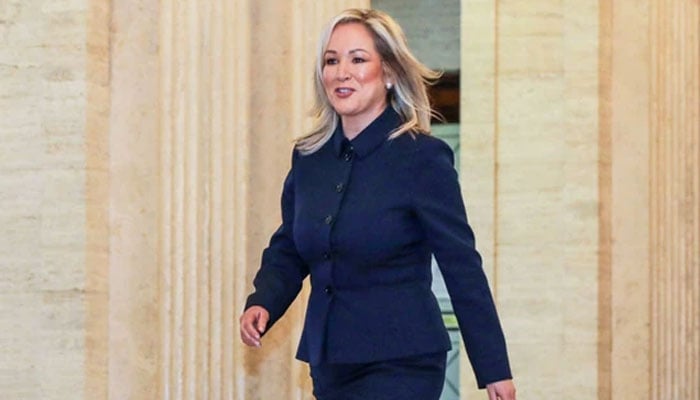For the first time, Irish nationalist set to lead Northern Ireland’s government
O’Neill will share power with deputy first minister Emma Little-Pengelly from the DUP
LONDON: An Irish nationalist made history Saturday by becoming Northern Ireland’s first minister as the government returned to work after a two-year boycott by unionists.
Sinn Fein Vice President Michelle O’Neill was nominated as first minister in the government that under the terms of the 1998 Good Friday peace accord shares power between Northern Ireland’s two main communities — British unionists who want to stay in the U.K., and Irish nationalists who seek to unite with Ireland. Northern Ireland was established as a unionist, Protestant-majority part of the U.K. in 1921, following independence for the Republic of Ireland.
“The days of second-class citizenship are long gone. Today confirms that they are never coming back,” O’Neill said. “As an Irish republican, I pledge cooperation and genuine honest effort with those colleagues who are British, of a unionist tradition, and who cherish the Union. This is an assembly for all – Catholic, Protestant and dissenter.”
Neither side can govern without agreement from the other. Government business ground to a half over the past two years after the Democratic Unionist Party walked out to protest trade issues related to Brexit.
O’Neill will share power with deputy first minister Emma Little-Pengelly from the DUP. The two will be equals, but O’Neill, whose party captured more seats in the Northern Ireland Assembly in the 2022 elections, will hold the more prestigious title.
Former DUP leader Edwin Poots was elected as speaker of the chamber.
O’Neill, 47, was elected to the Stormont Assembly in 2007 and comes from a family of Irish republicans. Her party, Sinn Fein, was affiliated with the militant Irish Republican Army during the Troubles, a period of about 30 years of violent conflict over the future of Northern Ireland which ended with the Good Friday Agreement.
Former Sinn Fein president Gerry Adams, who helped broker the historic peace agreement, was in the gallery at the assembly to see O’Neill’s nomination.
The return to government came exactly two years after a DUP boycott over a dispute about trade restrictions for goods coming into Northern Ireland from Great Britain. Northern Ireland’s 1.9 million people were left without a functioning administration as the cost of living soared and public services were strained. An open border between the north and the republic was a key pillar of the peace process that ended the Troubles, so checks were imposed instead between Northern Ireland and the rest of the U.K.
-
 Heavy Snowfall Disrupts Operations At Germany's Largest Airport
Heavy Snowfall Disrupts Operations At Germany's Largest Airport -
 Andrew Mountbatten Windsor Released Hours After Police Arrest
Andrew Mountbatten Windsor Released Hours After Police Arrest -
 Heidi Klum Eyes Spooky Season Anthem With Diplo After Being Dubbed 'Queen Of Halloween'
Heidi Klum Eyes Spooky Season Anthem With Diplo After Being Dubbed 'Queen Of Halloween' -
 King Charles Is In ‘unchartered Waters’ As Andrew Takes Family Down
King Charles Is In ‘unchartered Waters’ As Andrew Takes Family Down -
 Why Prince Harry, Meghan 'immensely' Feel 'relieved' Amid Andrew's Arrest?
Why Prince Harry, Meghan 'immensely' Feel 'relieved' Amid Andrew's Arrest? -
 Jennifer Aniston’s Boyfriend Jim Curtis Hints At Tensions At Home, Reveals Rules To Survive Fights
Jennifer Aniston’s Boyfriend Jim Curtis Hints At Tensions At Home, Reveals Rules To Survive Fights -
 Shamed Andrew ‘dismissive’ Act Towards Royal Butler Exposed
Shamed Andrew ‘dismissive’ Act Towards Royal Butler Exposed -
 Hailey Bieber Shares How She Protects Her Mental Health While Facing Endless Criticism
Hailey Bieber Shares How She Protects Her Mental Health While Facing Endless Criticism -
 Queen Elizabeth II Saw ‘qualities Of Future Queen’ In Kate Middleton
Queen Elizabeth II Saw ‘qualities Of Future Queen’ In Kate Middleton -
 Amanda Seyfried Shares Hilarious Reaction To Discovering Second Job On 'Housemaid': 'Didn’t Sign Up For That'
Amanda Seyfried Shares Hilarious Reaction To Discovering Second Job On 'Housemaid': 'Didn’t Sign Up For That' -
 Hilary Duff Reveals Deep Fear About Matthew Koma Marriage
Hilary Duff Reveals Deep Fear About Matthew Koma Marriage -
 Will Sarah Ferguson End Up In Police Questioning After Andrew’s Arrest? Barrister Answers
Will Sarah Ferguson End Up In Police Questioning After Andrew’s Arrest? Barrister Answers -
 Matthew McConaughey Gets Candid About AI Threat To Actors: 'Be Prepared'
Matthew McConaughey Gets Candid About AI Threat To Actors: 'Be Prepared' -
 Hailey Bieber Shares How 16-month-old Son Jack Blues Is Already Following In Justin Bieber's Footsteps
Hailey Bieber Shares How 16-month-old Son Jack Blues Is Already Following In Justin Bieber's Footsteps -
 Zuckerberg Denies At LA Trial That 'Instagram Targets Kids' Amid Addiction Claims
Zuckerberg Denies At LA Trial That 'Instagram Targets Kids' Amid Addiction Claims -
 France Sees Record 102mn International Tourists In 2025
France Sees Record 102mn International Tourists In 2025




